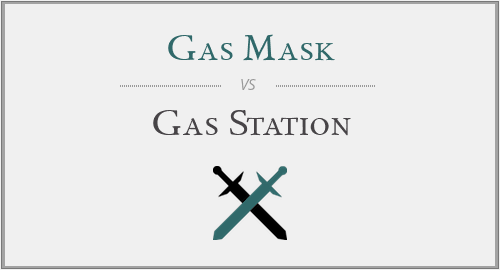Introduction
English is a language renowned for its nuances and occasional similarities between words that can lead to confusion. 'Gas mask' and 'gas station' are two such words, both involving the term 'gas,' but with entirely different meanings and grammatical roles. This essay aims to clarify the distinctions and similarities between these terms, focusing on their grammar and context.
Differences
The primary difference between 'gas mask' and 'gas station' lies in their meanings and usage:
'Gas Mask'
'Gas mask' is a compound noun referring to a protective breathing apparatus designed to shield the wearer from inhaling harmful gases, fumes, or airborne contaminants. It is typically used in situations where air quality is compromised or hazardous, such as during chemical emergencies, military operations, or industrial work.
Example Usages:
- Noun - Safety Equipment: The firefighter donned a gas mask before entering the smoke-filled building.
- Noun - Military Gear: Soldiers were equipped with gas masks to protect against chemical attacks.
'Gas Station'
'Gas station' is a compound noun indicating a facility where fuel, such as gasoline or diesel, is sold to vehicle owners for refueling. It is a place where drivers can stop to fill their tanks, and these establishments often offer additional services such as convenience stores, car washes, and air pumps.

Example Usages:
- Noun - Fuel Retail: We need to stop at the gas station to refuel before continuing our road trip.
- Noun - Services: The gas station also had a small cafe where we grabbed a quick snack.
Similarities
Despite the significant differences in meaning, 'gas mask' and 'gas station' share the word 'gas' as a component. This commonality can lead to potential confusion if the context is not clear.
Conclusion
In conclusion, 'gas mask' and 'gas station' are two words that include the term 'gas' but have entirely different meanings and grammatical roles. 'Gas mask' refers to a protective breathing apparatus used in hazardous environments, while 'gas station' indicates a facility where fuel is sold for vehicles. Recognizing the context and grammar distinctions between these terms is essential for clear and accurate communication in both spoken and written English.




Have a discussion about this article with the community:
Report Comment
We're doing our best to make sure our content is useful, accurate and safe.
If by any chance you spot an inappropriate comment while navigating through our website please use this form to let us know, and we'll take care of it shortly.
Attachment
You need to be logged in to favorite.
Log In